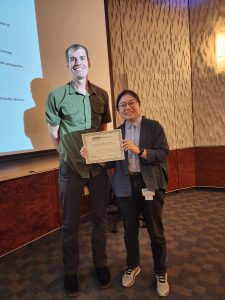September 27, 2024. Dr. Eran Agmon, PI at UConn Health, has received a DARPA grant to develop an innovative workflow for discovering unknown gene functions in whole-cell models of E. coli. The project, part of DARPA’s Discovering Unknown Function (DUF) initiative, will harness UConn’s HPC resources to simulate thousands of model variants, enhancing our understanding of E. coli gene functionality. This scalable workflow will leverage modular simulation, probabilistic data analysis, and advanced inference techniques to systematically address gaps in gene function knowledge.
Author: Mikhail Blinov
Dr. Kshitiz published a research on scar tissue formation
September 27, 2024. Dr. Kshitiz published a research paper in Nature Communications on scar matrix drives Piezo1 mediated stromal inflammation leading to placenta accreta spectrum
Dr. Leslie Loew named 2025 Biophysical Society Fellow
September 27, 2024. Congratulations to Dr. Leslie Loew, named a 2025 Biophysical Society Fellow for inventing fluorescent sensors of membrane potential and leadership in the development of computational cell biology.
Dr. Kshitiz Receives NIH Funding to Address Placenta Accreta
September 16, 2024. Dr. Kshitiz, associate professor at CCAM, receives the $2.5 million NIH grant to understand how previous scars from cesarean surgery can pave the way for aggressive invasion of the placenta into the mother’s uterus, and sometimes beyond. Kshitiz will be working alongside Dr. Molly Brewer from the Department of Obstetrics and Gynecology. Kshitiz supervises the Evolutionary Medicine Laboratory at UConn Health, investigating the unique evolutionary history of maternal fetal interface, harnessing the knowledge to develop therapies for human diseases, including cancer.
Jinhong Dong received 2024 Ann Cowan Outstanding Student Award
September 4, 2024. Jinhong Dong was awarded the 2024 Ann Cowan* Outstanding Student Award in Systems Biology, which recognizes a student with exceptional academic and scholarly achievements in the previous academic year. Jinhong presented at the 2023 International Conference of Systems Biology and the 2024 Cold Spring Harbor Systems Biology meeting. Jinhong’s thesis work addresses a fundamental question in the gene regulation field: what are the molecular mechanisms by which transcription factor proteins can paradoxically repress and activate genes? The work is currently making it through the peer review process and a preprint is available on bioRχiv: https://doi.org/10.1101/2024.05.13.594008. In addition, Jinhong’s expertise in ChIP-seq and ATAC-seq experiments and analysis prompted an invitation to participate as a teaching assistant for the 2024 Cold Spring Harbor Laboratory’s Chromatin, Epigenetics & Gene Expression course. Jinhong is regarded as an ideal lab citizen who is always willing to help her peers and colleagues. Congratulations to Jinhong!
*Dr. Ann Cowan, Professor Emerita, has been a champion for graduate students at UConn Health generally, and particularly in the Systems Biology area of concentration. This annual prize is named in honor of her vast contributions to our graduate program.
